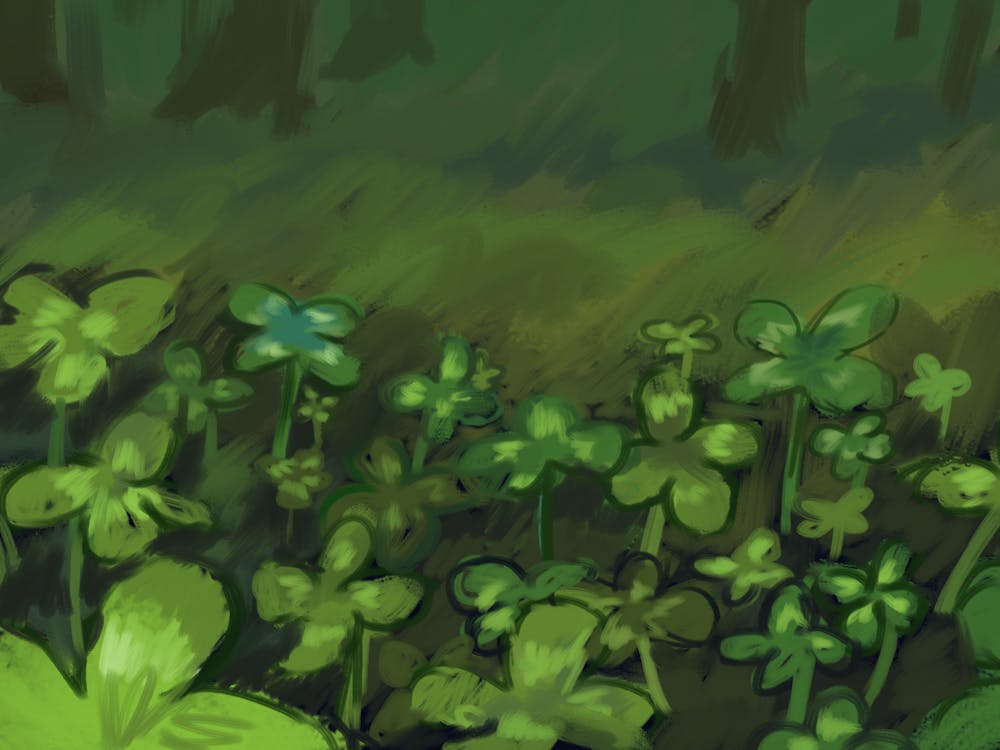If you cannot find me, look for me in the grass. In the rich green patches of earth, where the clovers grow, I am seated as I search for lucky four-leafs of my own. I sometimes feel guilty for uprooting the magic for the sake of my own collection. But then I stumble upon a little boy crying, and as I hand him one of my lucky charms—a four-leaf clover, scotch-taped to a post-it for safekeeping—I watch his tears dry and a smile take their place.
In all honesty, I have no idea how rare four-leaf clovers actually are. I have found far too many to count, even a six-leaf clover. Perhaps my quest for these auspicious little weeds takes away their alleged luck, the same as if I were to scan the floor of every supermarket checkout aisle to try and find a heads-up penny on the ground. Maybe my luck is manufactured—trying hard or long enough suffices to yield the so-called lucky outcome I desire. Or, maybe the fact that I have found so many four-leaf clovers, even considering my great efforts, is reflective of my magnetic ability to attract all that is lucky. Regardless, I don’t really care. When I lay down at the park and comb my fingers through the countless sprouting clovers, I feel the promise of good fortune. I find magic in the sheer fact that my world can stand still for even a moment of my search. This magic is perhaps even self-created through the meditative practice that this ritual of mine has become.
I often find myself beaming with excitement upon encountering what I believe to be a four-leaf clover—only to discover that its fourth leaf actually belongs to a different clover. Nevertheless, I am always in awe of the beauty I am able to find in the what-could-have-beens. There is something so poetic about the realization that a four-leaf clover is no less powerful in its conception than in tangible form. I recognize that a clover’s perceived “luck” relies on an arbitrary metric, so I choose to consider myself lucky regardless of the number of leaves my clovers boast. Plus, the luck I desire already exists in my mind and in the clover patches to which I will soon make my way. It is only a matter of time and patience before I meet the physical embodiment of the luck I already possess.
As I lay in the grass, careful to avoid crushing the clovers with my body weight, I have the occasional moment of realization: doing *this* rather than school work or some typical student extracurricular like a club sport or watching Netflix is a little odd. I feel like a character straight out of a story book—like I can’t possibly be a real person. Similar to a fairy or a woodland creature or an eccentric and whimsical dreamer, I am enchanted by nature. I love to notice its every detail—so much so that I spend hours at a time looking in the grass.
When I am in this state of being, my self-portrait, as I imagine it to be, takes the form of the “manic pixie dream girl” trope. To those who are unfamiliar, the manic pixie dream girl is the archetypal supporting role of an exuberant, zany, yet charming young woman who typically exists for the purpose of helping the male protagonist find himself. The manic pixie dream girl, when appreciated independent of the protagonist, does not let social norms and people’s opinions dictate her personal and life choices. As much as I love my silly little clover girl adventures, I do realize how passersby may raise an eyebrow when I appear to be watching grass grow. Like the manic pixie dream girl, however, I have learned, through my various idiosyncratic pleasures, to give little thought to what people think when they see me. In my perception of myself and my personhood, I have thus identified myself within this trope. Perhaps I not only fill the manic pixie dream girl role, but also the (traditionally male) protagonist’s role in this story. As my version of the archetypal tale goes, I (the protagonist) find myself, as my inner manic pixie dream girl helps me (the protagonist) understand patience and gratitude through the hours-long search for a four-leaf clover. The unfettered dreamer inside me tells the overachiever in me that it is more than okay to let time stop for a moment, lay in the grass, and appreciate the gift of this moment on this earth.
In my life, the manic pixie dream girl in me is the main character. She gets to be enamored with the world and independent and curious without those qualities largely existing for a man’s benefit. First and foremost, she uses her sense of self and refreshingly positive outlook to live out her most fulfilling and empowered life. She believes she can find four-leaf clovers anywhere, and so she does. But, even if she couldn’t, she still feels lucky enough that she finds the four-leaf clovers within herself, and thus harnesses their magic and good fortune—as do I.
I have fallen in love with the process of searching for luck I believe I already possess. Having that extra little charm, though, is how I, as the manic pixie dream girl, convince those less rose-sighted than I that this luck belongs to them, too. I look down, around, and within.I see pastures of four-leaf clovers everywhere I turn.





